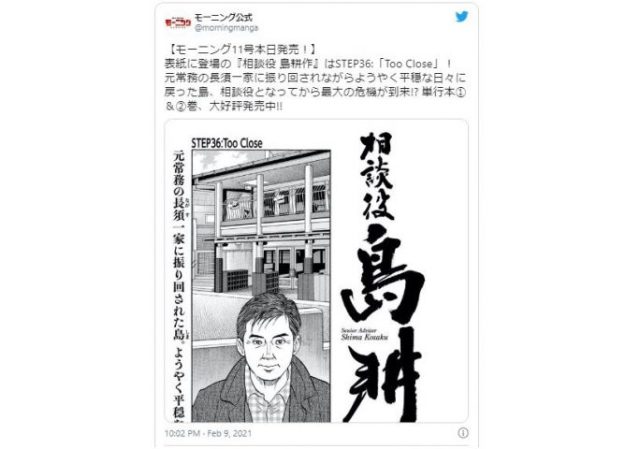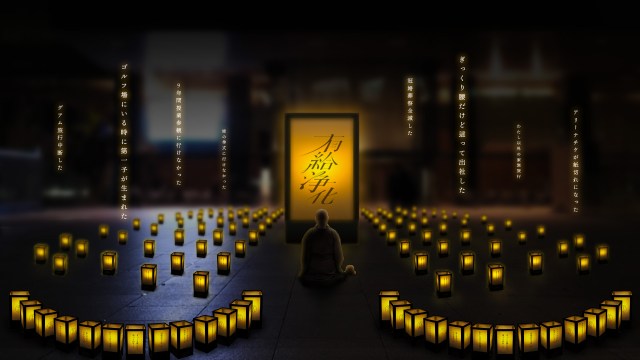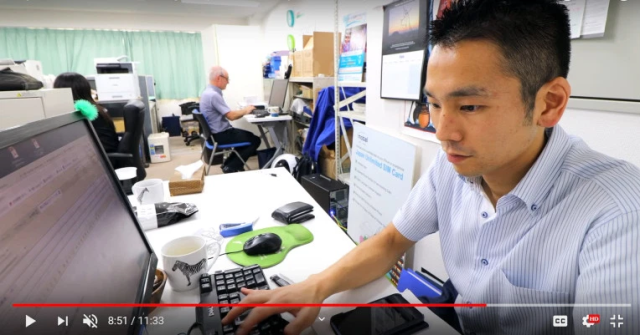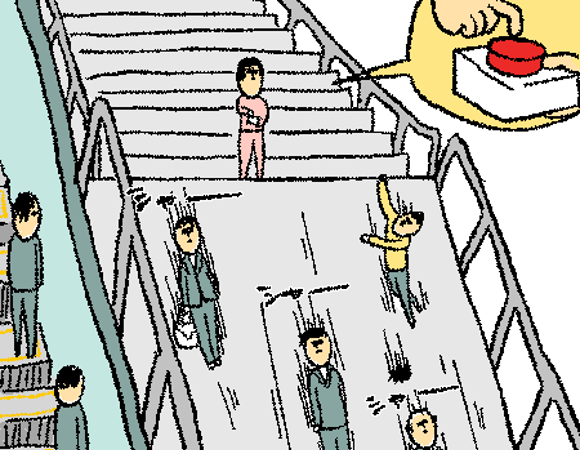salarymen
Manga readers are concerned about the fate of Kosaku Shima, whose corporate developments they’ve been following since 1983.
Workaholics asked to address this senseless loss in a country where taking paid leave is frowned upon.
Many were depressed by some of the comments made by overseas YouTube users who found the workday in the video long and tiresome.
Think Japanese businessmen don’t care about their wives? This one does, and he’s got no time for anyone keeping him from taking care of her.
Our veteran salaryman-turned-reporter gives his idea for the one thing that has to change before Japan will stop working itself to death.
A new survey reveals that a startling number of Japanese workers are literally losing sleep over their stressful jobs.
Labels the country’s schools as stifling “salaryman training facilities.”
It’s no secret that working in Japan can be pretty miserable. Long hours, unpaid overtime, power harassment, and mandatory drinking parties with coworkers are just some of the factors that contribute to workers all over Japan leading stressful lives.
But misery loves company, so that’s why we present the top 11 tweets to make you feel glad you don’t work in Japan. Some of them are attempts at encouragement, some of them are commiserating, and some of them are so painfully sad that you can’t help but cry. So read on and see how your own work compares to Japan!
Recently the world got a look at the busy world of salarymen in Japan via a viral video, but there were also some slight reassurances that these company men didn’t necessarily hate their lives. We may have been a bit too optimistic, however, because a study done last year found that less than 30 percent of Japanese man can confidently say, “I am happy.” Well… that’s some statistic.
What’s behind the unhappiness factor among Japanese men? Bad marriages, work problems, convenience store diets? Accomplished Japanese author Reiko Yuyama gives her two yen on the root of the problem.
According to a 2012 survey of 2,000 Shinsei Bank employees, the average worker now spends 510 yen (US $5.79) on lunch every day. That’s down from 710 yen (US $8.06) in 2001 and 600 yen (US $6.81) in 2007. That’s a 30% decrease in twelve years.
Nikkan Spa, a popular magazine in Japan, conducted its own survey and found an even bleaker outcome. In a survey of 100 salarymen (office workers) and public servants in their 30s and 40s, a surprising 64 percent of workers admitted that they spend 500 yen (US $5.67) or less on lunch. An even more astonishing 24 percent of workers get by on just 250 yen (US $2.84) a day.
A measly 250 yen (US $2.84) won’t even buy a beef bowl at Sukiya, famed to be the cheapest lunch around. If these salarymen can’t even afford the cheapest meals available for purchase, what exactly are they eating? Let’s take a peek inside the slimmed-down lunchboxes of Japan’s typical worker.













 Starbucks Japan releases first-ever Hinamatsuri Girls’ Day Frappuccino
Starbucks Japan releases first-ever Hinamatsuri Girls’ Day Frappuccino Drift ice in Japan is a disappearing winter miracle you need to see now
Drift ice in Japan is a disappearing winter miracle you need to see now Japan Extreme Budget Travel! A trip from Tokyo to Izumo for just 30,000 yen [Part 2]
Japan Extreme Budget Travel! A trip from Tokyo to Izumo for just 30,000 yen [Part 2] Sync! Illumination lets you watch Tokyo Disneyland Electrical Parade from home on multiple phones
Sync! Illumination lets you watch Tokyo Disneyland Electrical Parade from home on multiple phones 566 million yen in gold bars donated to Japanese city’s water bureau
566 million yen in gold bars donated to Japanese city’s water bureau Japanese video 18-Year-Old Grandpa has important, moving message behind its silly-sounding title
Japanese video 18-Year-Old Grandpa has important, moving message behind its silly-sounding title Photos from 140 years ago show Tokyo’s skyline was amazing long before the Skytree was ever built
Photos from 140 years ago show Tokyo’s skyline was amazing long before the Skytree was ever built Shin Godzilla trailer released, hits very close to home【Video】
Shin Godzilla trailer released, hits very close to home【Video】 Top 100 manga of all time chosen by survey of 150,000 Japanese people
Top 100 manga of all time chosen by survey of 150,000 Japanese people Which convenience store onigiri rice balls are the most popular? Survey reveals surprising results
Which convenience store onigiri rice balls are the most popular? Survey reveals surprising results Highest Starbucks in Japan set to open this spring in the Tokyo sky
Highest Starbucks in Japan set to open this spring in the Tokyo sky The 10 most annoying things foreign tourists do on Japanese trains, according to locals
The 10 most annoying things foreign tourists do on Japanese trains, according to locals Tokyo Skytree turns pink for the cherry blossom season
Tokyo Skytree turns pink for the cherry blossom season Yakuzen ramen restaurant in Tokyo is very different to a yakuza ramen restaurant
Yakuzen ramen restaurant in Tokyo is very different to a yakuza ramen restaurant Shibuya Station’s Hachiko Gate and Yamanote Line stairway locations change next month
Shibuya Station’s Hachiko Gate and Yamanote Line stairway locations change next month Starbucks Japan releases new sakura goods and drinkware for cherry blossom season 2026
Starbucks Japan releases new sakura goods and drinkware for cherry blossom season 2026 Starbucks Japan adds new sakura Frappuccino and cherry blossom drinks to the menu
Starbucks Japan adds new sakura Frappuccino and cherry blossom drinks to the menu Japan Extreme Budget Travel! A trip from Tokyo to Izumo for just 30,000 yen [Part 1]
Japan Extreme Budget Travel! A trip from Tokyo to Izumo for just 30,000 yen [Part 1] Japan’s new “Cunte” contact lenses aren’t pronounced like you’re probably thinking they are
Japan’s new “Cunte” contact lenses aren’t pronounced like you’re probably thinking they are Japan’s newest Shinkansen has no seats…or passengers [Video]
Japan’s newest Shinkansen has no seats…or passengers [Video] Foreigners accounting for over 80 percent of off-course skiers needing rescue in Japan’s Hokkaido
Foreigners accounting for over 80 percent of off-course skiers needing rescue in Japan’s Hokkaido Super-salty pizza sends six kids to the hospital in Japan, linguistics blamed
Super-salty pizza sends six kids to the hospital in Japan, linguistics blamed Starbucks Japan unveils new sakura Frappuccino for cherry blossom season 2026
Starbucks Japan unveils new sakura Frappuccino for cherry blossom season 2026 Foreign tourists in Japan will get free Shinkansen tickets to promote regional tourism
Foreign tourists in Japan will get free Shinkansen tickets to promote regional tourism Take a trip to Japan’s Dododo Land, the most irritating place on Earth
Take a trip to Japan’s Dododo Land, the most irritating place on Earth Naruto and Converse team up for new line of shinobi sneakers[Photos]
Naruto and Converse team up for new line of shinobi sneakers[Photos] Is China’s don’t-go-to-Japan warning affecting the lines at a popular Tokyo gyukatsu restaurant?
Is China’s don’t-go-to-Japan warning affecting the lines at a popular Tokyo gyukatsu restaurant? Survey asks foreign tourists what bothered them in Japan, more than half gave same answer
Survey asks foreign tourists what bothered them in Japan, more than half gave same answer Japan’s human washing machines will go on sale to general public, demos to be held in Tokyo
Japan’s human washing machines will go on sale to general public, demos to be held in Tokyo Starbucks Japan releases new drinkware and goods for Valentine’s Day
Starbucks Japan releases new drinkware and goods for Valentine’s Day We deeply regret going into this tunnel on our walk in the mountains of Japan
We deeply regret going into this tunnel on our walk in the mountains of Japan Studio Ghibli releases Kodama forest spirits from Princess Mononoke to light up your home
Studio Ghibli releases Kodama forest spirits from Princess Mononoke to light up your home Major Japanese hotel chain says reservations via overseas booking sites may not be valid
Major Japanese hotel chain says reservations via overseas booking sites may not be valid Put sesame oil in your coffee? Japanese maker says it’s the best way to start your day【Taste test】
Put sesame oil in your coffee? Japanese maker says it’s the best way to start your day【Taste test】 No more using real katana for tourism activities, Japan’s National Police Agency says
No more using real katana for tourism activities, Japan’s National Police Agency says Japanese video 18-Year-Old Grandpa has important, moving message behind its silly-sounding title
Japanese video 18-Year-Old Grandpa has important, moving message behind its silly-sounding title Photos from 140 years ago show Tokyo’s skyline was amazing long before the Skytree was ever built
Photos from 140 years ago show Tokyo’s skyline was amazing long before the Skytree was ever built Shin Godzilla trailer released, hits very close to home【Video】
Shin Godzilla trailer released, hits very close to home【Video】 Top 100 manga of all time chosen by survey of 150,000 Japanese people
Top 100 manga of all time chosen by survey of 150,000 Japanese people Which convenience store onigiri rice balls are the most popular? Survey reveals surprising results
Which convenience store onigiri rice balls are the most popular? Survey reveals surprising results New Mochi Cream Doughnuts from Mister Donut pay homage to Japanese confectionery
New Mochi Cream Doughnuts from Mister Donut pay homage to Japanese confectionery Japanese restaurant chain serves Dragon Ball donuts and Senzu Beans this spring
Japanese restaurant chain serves Dragon Ball donuts and Senzu Beans this spring A visit to “the most blessed kappa statues in all of Japan”【Photos】
A visit to “the most blessed kappa statues in all of Japan”【Photos】 Starbucks Japan releases new sakura goods and drinkware for cherry blossom season 2026
Starbucks Japan releases new sakura goods and drinkware for cherry blossom season 2026 Japanese Twitter falls in love with unusual vending machine in Akihabara
Japanese Twitter falls in love with unusual vending machine in Akihabara Majority of Japanese women in survey regret marrying their husband, but that’s only half the story
Majority of Japanese women in survey regret marrying their husband, but that’s only half the story Highest Starbucks in Japan set to open this spring in the Tokyo sky
Highest Starbucks in Japan set to open this spring in the Tokyo sky Blowfish-shaped fugu bento appears to celebrate Japan’s Blowfish Day [Taste test]
Blowfish-shaped fugu bento appears to celebrate Japan’s Blowfish Day [Taste test]